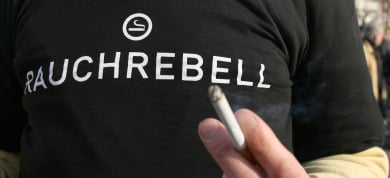Stephan Schlage decided to quit smoking cigarettes six weeks ago, shortly after a smoking ban went into effect to clear the air in bars and restaurants across much of Germany.
But a recent weekday evening in Berlin found him happily wreathed in smoke despite the new law, as friends and customers were still puffing away at his wife’s bar. And her establishment is only one of many across the city to flout the new rules. Though the ban went into effect at the start of January, it has done little to lift the haze in the German capital’s numerous bars and cafes.
City officials have announced they won’t enforce the law until July 1 and nicotine-friendly bars are taking advantage of the grace period by openly advertising their distinctly un-Teutonic brand of civil disobedience.
“Dear guests, in the Café BöseBubenBar you can keep on smoking and drinking and eating and meeting friends and being served after Jan. 1,” reads a sign posted prominently in the door of the bar of Schlage’s wife located in Berlin’s government quarter.
“I think it was just a clever political move,” he said. “The state acts like mommy and daddy at the same time and is always taking over something or other.”
Fourteen of Germany’s 16 federal states now ban smoking in restaurants and bars, according to DEHOGA, a national association of hotels and restaurants. Bans will take effect in July in the remaining two states of North Rhine-Westphalia and Thuringia.
But German antipathy toward the smoking ban extends beyond its frequently anti-authoritarian capital city.
Though most hotels and restaurants have had few problems following the new bans, it’s a different story in bars and pubs throughout the country, DEHOGA spokeswoman Stefanie Heckel said. A DEHOGA survey last year in the southern state of Baden-Württemberg found that 63 percent of small pubs and clubs reported an average 20-percent drop in business in the initial weeks of the smoking ban. Only three percent of pubs reported business had increased.
The new rules are especially hard on the country’s smallest taverns, the so-called corner pubs, or Eckkneipe in German, with only one room and no space for a separate smoking area. These are the places where regulars are used to lighting up as they please, Heckel said. Her organization is backing a bartender from the southern city of Tübingen in a lawsuit challenging the constitutionality of the ban.
A court in the state of Rhineland-Palatinate in western Germany put the smoking ban there on temporary hold on Feb. 11, ruling that owner-operated one-room pubs do not have to follow the law until the constitutional lawsuit is decided.
But while bar owners throughout Germany protest the ban and await the outcome of legal wrangling, in Berlin the passive resistance – and passive smoking – will continue at least until July 1.
“It’s no secret in Berlin who isn’t following the law,” said Regina Kneiding, spokeswoman for the city’s office for Health, the Environment and Consumer Protection. Kneiding said officials even expected Berlin’s bars to defy the law at first.
“This is still something totally new, a complete shift for the entire field. It’s not a change that can be made overnight. It will only work if responsibility is shared by all,” she said. “We expect that once it’s in earnest, and once there are fines, the situation will change.”
Businesses caught breaking the smoking ban will be subject to a €1,000 penalty and individuals will be fined up to €100. Separate smoking rooms are allowed but must be in the rear of the establishment and smaller than the main room. Customers also cannot be made to walk through the smoking area on the way to the restroom.
Responsibility for enforcement will fall on the public order offices of Berlin’s 12 city districts. Both the senate office and individual districts are already collecting complaints – Kneiding said her office has compiled more than 55 complaints – and some have already given warnings to bars that aren’t following the law. BöseBuben – which means “Bad Boys” in German – was one of the bars to be notified of a complaint, and the owners plan to set up a smokers’ room once the six-month grace period is over.
Bartender Kristof Zdunek said he thinks people’s habits will change – Berliners have already mostly given up smoking on the city’s public transportation network – but he predicts it won’t be easy in a country where most people have associated smoking with socializing since their school days.
“Wherever things revolve around beer and coffee that’s where people want to smoke,” Zdunek said.



 Please whitelist us to continue reading.
Please whitelist us to continue reading.